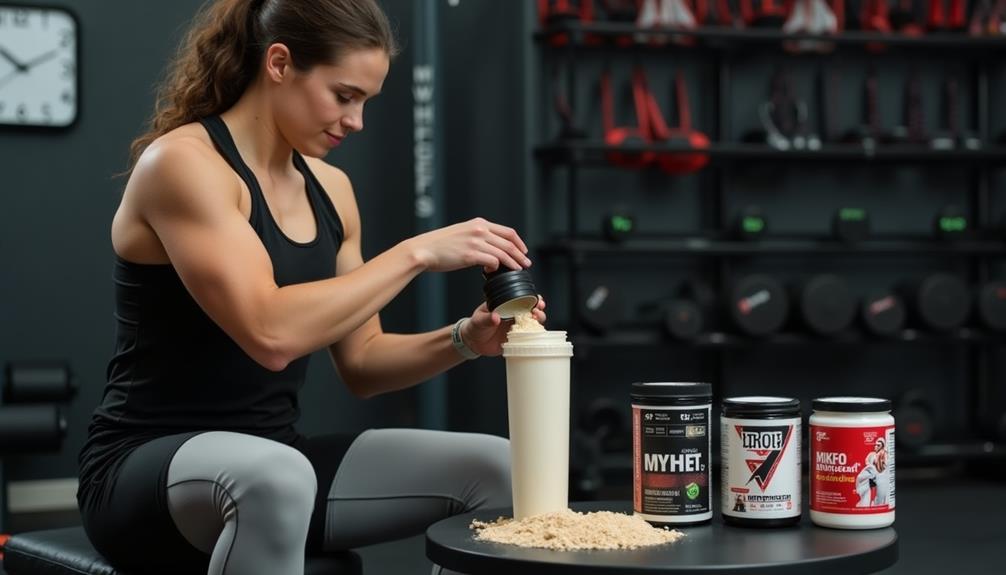To support your recovery after endurance training, focus on protein supplementation. First, aim for 1.2 to 1.4 grams of protein per kilogram of body weight daily. Choose quick-digesting sources like whey protein or go for plant-based options if you're dairy-sensitive. Timing matters too—consume protein within 30 to 60 minutes post-workout for best muscle repair. Consider combining protein with carbs, ideally in a 3:1 or 4:1 ratio, to enhance recovery. Quality matters, so prioritize nutrient-rich options, and make adjustments based on your individual needs. There's more to explore about optimizing your protein intake strategies.
Core Insights
- Consume protein within 30 to 60 minutes post-workout to enhance muscle recovery and repair.
- Aim for 1.2 to 1.4 grams of protein per kilogram of body weight daily for endurance athletes.
- Combine protein with carbohydrates in a 3:1 or 4:1 ratio to restore glycogen levels and support recovery.
- Consider high-quality protein sources like whey, Greek yogurt, or legumes for optimal post-workout nutrition.
- Space protein intake throughout the day to maintain ongoing muscle recovery and growth.
Importance of Protein After Training

After an intense training session, your muscles crave nourishment, making protein essential for recovery. Protein plays a pivotal role in repairing muscle fibers damaged during your workout. It helps to rebuild and strengthen these fibers, which is essential for enhancing your performance in future sessions. For endurance athletes, post-workout vitamins can complement protein intake, supporting overall recovery and replenishing essential nutrients lost during prolonged exercise.
When you consume protein post-training, you kickstart muscle protein synthesis, the process that aids recovery and growth. This can lead to reduced soreness and improved overall endurance.
Aim to include a source of protein within 30 to 60 minutes after your workout. It's a critical window for maximizing your recovery. By prioritizing protein intake, you're not just feeding your muscles; you're investing in your training success and preparing for your next challenge.
Types of Protein Supplements

What types of protein supplements should you consider for your endurance training?
There are several options available that cater to different needs. Whey protein is a popular choice because it's quick-digesting and rich in essential amino acids. Grass-fed whey protein is an excellent option for those seeking a high-quality, nutrient-dense supplement. It's known for its superior amino acid profile and potential health benefits. If you're dairy-sensitive, consider plant-based proteins like pea or brown rice protein. They offer a good amino acid profile and are easy on the stomach.
Casein protein is another option, providing a slow release of amino acids, making it perfect for nighttime recovery. For those looking to boost their protein intake without extra carbs, protein isolate is a suitable choice. Finally, you might explore protein blends, which combine various sources for a balanced approach. Choose one that aligns with your dietary preferences and recovery goals.
Ideal Protein Amounts

When determining your ideal protein intake for endurance training, it's important to take into account your individual goals and activity levels. Generally, endurance athletes should aim for about 1.2 to 1.4 grams of protein per kilogram of body weight daily. If you're training intensely or trying to build muscle, you might benefit from higher amounts, up to 1.6 grams per kilogram. For those looking to supplement their protein intake, EAA powders can provide a detailed amino acid profile to support muscle recovery and growth.
Don't forget to contemplate your overall diet. If you're consuming a variety of nutrient-dense foods, you may meet your protein needs more easily. Monitoring your performance and recovery can also guide adjustments. Remember, it's not just about the amount; quality matters too. Prioritize high-quality protein sources to support your training effectively.
Timing Your Protein Intake

Post-Workout Window
Aim to consume protein within 30 to 60 minutes after your endurance workouts. This time frame is critical for muscle recovery and helps repair any damage caused during training.
Regular Intervals
Beyond the immediate post-workout period, try to space your protein intake throughout the day. Consuming protein every few hours can support ongoing muscle recovery and growth, ensuring your body has a constant supply of amino acids.
Personalize Your Timing
Protein Sources for Recovery

Choosing the right protein sources for recovery is essential for maximizing your endurance training benefits. After a long workout, your body needs quality protein to repair muscles and support recovery. Here are some great options to contemplate:
| Protein Source | Benefits | Suggested Serving |
|---|---|---|
| Whey Protein | Fast absorption | 20-30 grams |
| Greek Yogurt | Probiotics, calcium | 1 cup |
| Chicken Breast | Lean protein | 3-4 ounces |
| Lentils | Plant-based protein | 1 cup cooked |
Incorporating these sources into your post-workout routine can help you feel stronger and ready for your next session. Remember, quality matters just as much as quantity when it comes to recovery.
Combining Protein With Carbs

To enhance your recovery and performance, combining protein with carbohydrates is a game-changer. After your endurance training, your body craves nutrients to rebuild and replenish. Protein helps repair muscle tissue, while carbohydrates restore glycogen levels, providing energy for your next workout.
Aim for a 3:1 or 4:1 ratio of carbs to protein in your post-training meal or shake. For example, if you consume 20 grams of protein, pair it with 60 to 80 grams of carbs. This combination not only speeds up recovery but also supports muscle growth.
Quick options include a protein smoothie with fruit, yogurt with granola, or a turkey sandwich on whole-grain bread. By thoughtfully combining these nutrients, you'll maximize your post-workout benefits and feel ready for your next challenge.
Personalized Supplement Strategies

Finding the right protein and carbohydrate combination is just the starting point. To create a personalized supplement strategy, you need to take into account your individual training goals, body composition, and dietary preferences. Start by evaluating your daily routine and nutritional needs. Are you aiming for muscle gain, weight loss, or improved endurance?
Once you've identified your goals, experiment with different protein sources, such as whey, casein, or plant-based options, to see what works best for you. Don't forget to consider your carbohydrate intake, as it plays a vital role in recovery and energy replenishment.
Monitoring Your Progress
As you embark on your endurance training journey, monitoring your progress is crucial to verify you're on track to meet your goals. Keeping tabs on various metrics will help you fine-tune your regimen and confirm effective protein supplementation. Here are four key areas to focus on:
- Performance Metrics: Track your distance, speed, and endurance levels during workouts.
- Body Composition: Regularly measure your weight and body fat percentage to evaluate changes.
- Recovery Rates: Note how quickly you bounce back after intense training sessions.
- Supplement Effects: Pay attention to how your body responds to protein supplements, adjusting as necessary.
Frequently Asked Questions
Can I Rely Solely on Whole Foods for Protein Recovery?
Yes, you can depend on whole foods for protein recovery. Whole foods provide essential nutrients, and if you plan your meals well, you'll meet your protein needs. Just make sure you're getting a variety of protein sources.
Are There Any Side Effects of Excessive Protein Consumption?
Imagine a balloon filled to the brim; too much protein can lead to discomfort, dehydration, and kidney strain. It's crucial to balance intake, ensuring your body's support without overwhelming it. Moderation's key for peak health.
Is Plant-Based Protein as Effective as Animal Protein?
Plant-based protein can be just as effective as animal protein for muscle growth and recovery, provided you consume a variety of sources. It's important to guarantee you're getting all essential amino acids in your diet.
How Long Does Protein Supplementation Stay in the Body?
Protein supplementation typically stays in your body for about 24 to 48 hours, depending on factors like your metabolism and activity level. It's important to time your intake to maximize benefits for recovery and muscle growth.
Can Protein Supplements Help With Muscle Soreness?
Imagine your muscles screaming like a banshee after a workout. Protein supplements can help soothe that soreness, reducing recovery time and making you feel like a superhero ready to conquer the next challenge. You'll love it!

